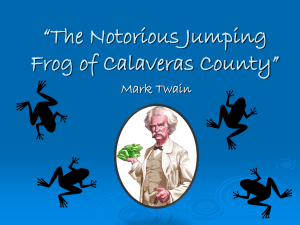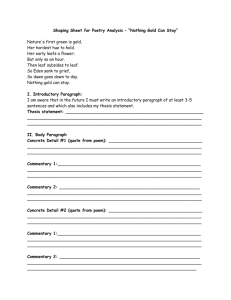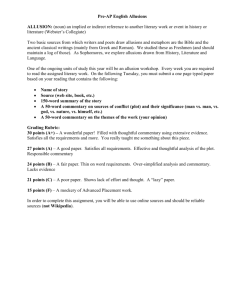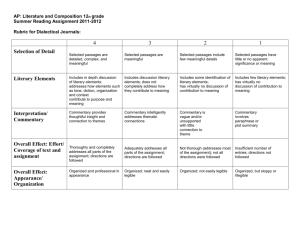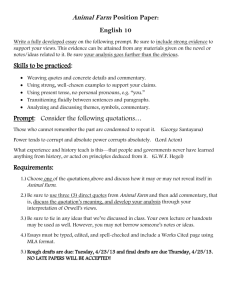Syllabus - Nashville State Community College
advertisement
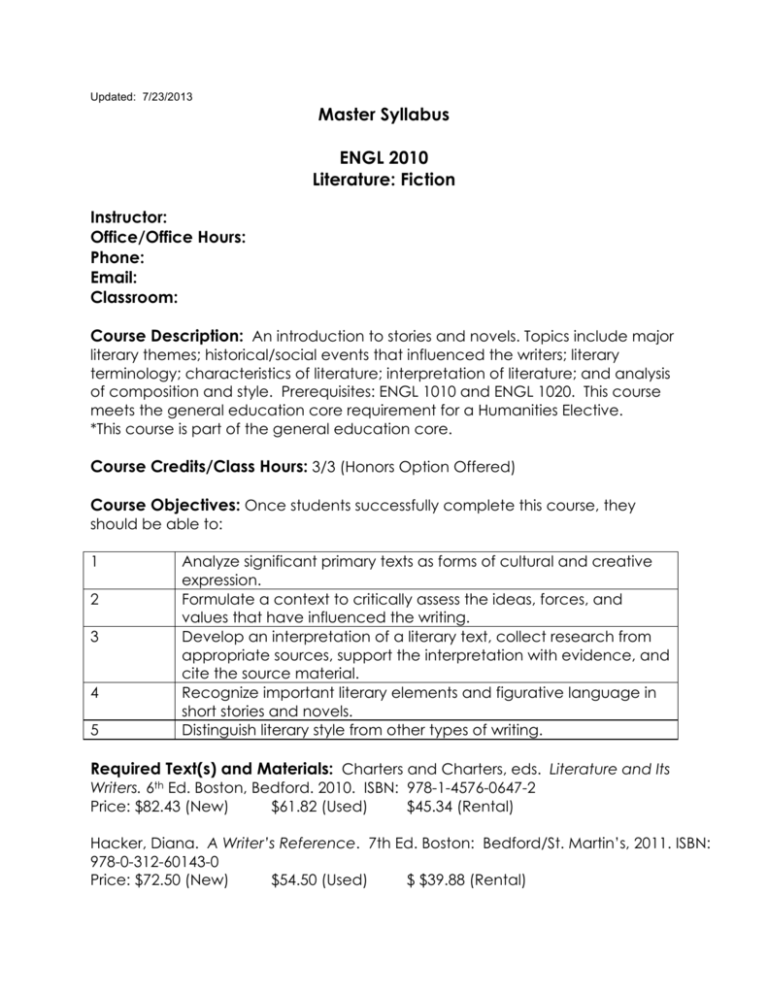
Updated: 7/23/2013 Master Syllabus ENGL 2010 Literature: Fiction Instructor: Office/Office Hours: Phone: Email: Classroom: Course Description: An introduction to stories and novels. Topics include major literary themes; historical/social events that influenced the writers; literary terminology; characteristics of literature; interpretation of literature; and analysis of composition and style. Prerequisites: ENGL 1010 and ENGL 1020. This course meets the general education core requirement for a Humanities Elective. *This course is part of the general education core. Course Credits/Class Hours: 3/3 (Honors Option Offered) Course Objectives: Once students successfully complete this course, they should be able to: 1 2 3 4 5 Analyze significant primary texts as forms of cultural and creative expression. Formulate a context to critically assess the ideas, forces, and values that have influenced the writing. Develop an interpretation of a literary text, collect research from appropriate sources, support the interpretation with evidence, and cite the source material. Recognize important literary elements and figurative language in short stories and novels. Distinguish literary style from other types of writing. Required Text(s) and Materials: Charters and Charters, eds. Literature and Its Writers. 6th Ed. Boston, Bedford. 2010. ISBN: 978-1-4576-0647-2 Price: $82.43 (New) $61.82 (Used) $45.34 (Rental) Hacker, Diana. A Writer’s Reference. 7th Ed. Boston: Bedford/St. Martin’s, 2011. ISBN: 978-0-312-60143-0 Price: $72.50 (New) $54.50 (Used) $ $39.88 (Rental) Writer's Reference Companion Website In place of A Writer’s Reference, any English handbook with current MLA standards will be adequate. Americans with Disabilities Act: NSCC complies with the Americans with Disabilities Act. If you would like to request any accommodation for this course, please contact the Coordinator of Disabilities at 615.353.3721. Zero Tolerance Policy for Disruptive Conduct in the Classroom • • • • The instructor has primary responsibility for control over classroom behavior and maintenance of academic integrity. He/she can order temporary removal or exclusion from the classroom of any student engaged in disruptive conduct or conduct which violates the general rules and regulations of the College. Disruptive behavior in the classroom that obstructs or disrupts the learning environment is defined as: o Offensive language; o Harassment of students or professors; o Repeated outbursts from a student which disrupt the flow of instruction or prevent concentration on the subject taught; o Failure to cooperate in maintaining classroom decorum; and o Continued use of any electronic or other noise or light emitting device which disturbs others: beepers, cell phones, palm pilots, laptop computers, games, etc. Students who are removed from class for disruptive behavior will not be allowed to return until the issue is resolved and may be administratively withdrawn from the course or the college. Academic Integrity Statement • • • Students guilty of academic dishonesty, either directly or indirectly through participation or assistance, are responsible to the instructor of the class. Academic dishonesty is defined as but not limited to plagiarism, cheating, misrepresenting one’s work, and forging documentation. Possible disciplinary sanctions may be imposed through the regular institutional procedures as a result of academic misconduct. The instructor has the authority to assign an “F” or “zero” for the exercise or examination, or to assign an “F” for the course. Grading Criteria: Each instructor will provide students with a rubric for assessment of work and stated grading standards for the course. Grading Scale: Each instructor will provide students with letter grades and/or points. Attendance and Tardiness Policies: Each instructor will provide information regarding his/her attendance policy. Failure to attend class will result in a final course grade of “FA” or “FN” (see explanation below), depending on the individual instructor’s course policy. “FA”= failure, attendance-related (unofficial withdrawal) Last recorded date of attendance is required. “FN”= failure, never attended class (unofficial withdrawal) D2L/NSOnline and MyNSCC e-mail: It is the student’s responsibility to check D2L/NSOnline and MyNSCC e-mail on a regular basis. These are the official communication channels between the college and students. Students are responsible for the information communicated through those channels. D2L/NSOnline contains specific course information and MyNSCC contains information important for other purposes. Academic Early Warning System: Nashville State Community College has implemented an Early Warning System to notify students via e-mail about academic problems such as poor classroom attendance, poor performance on assignments/tests, poor communication skills, late/missing assignments, and/or lack of classroom participation. Please note that Early Warning Alerts do not affect a student’s academic standing. Late Work Policy: Each instructor will provide students with policy. Plagiarism/Cheating Policy: At the discretion of the instructor, students who cheat or steal work from another source will either (1) be dismissed from class with a grade of “F” or (2) receive a grade of “F” for the assignment/test. Some examples of plagiarism and cheating are using undocumented sources, copying work verbatim from the Internet, using someone else’s work, recycling work from another class, using unauthorized notes during an exam, and/or looking on a classmate’s test/paper. Instructors may further define honor code violations on the syllabus. Many instructors use Turnitin, a software program that detects and documents plagiarized work. Students charged with Academic Misconduct will receive written notice in person or via NSCC email or regular mail. Students have five working days to appeal the sanction to the Dean for Student Services. Testing, Papers, Course Work: Each instructor will provide students with course information. Sample Course Schedule: Week Week 1 Week 2 Week 3 Week 4 Week 5 Week 6 Assignment Introduction Read intro pages 5-31 this week and next week. Faulkner: “A Rose for Emily” 146 Faulkner: The Meaning of “A Rose for Emily” 595 Chopin: “The Story of an Hour” 121 Commentary: Chopin “How I Stumbled upon Maupassant” 592 O’Connor: “A Good Man Is Hard to Find” 447 O’Connor: “Good Country People” 433 Commentary: O’Connor - The Element of Suspense in “A Good Man Is Hard to Find” 674 Jackson “The Lottery” 235 Commentary: Jackson – “The Morning of June 28, 1949, and “The Lottery” 607 Welty: “A Worn Path” 555 Commentary: Welty – “Is Phoenix Jackson’s Grandson Really Dead?” 632 Garcia Marquez: “A Very Old Man with Enormous Wings” 166 Hurston: “Spunk” 230 Commentary: Hurston – “How it Feels to Be Colored Me” 604 Lawrence: “The Rocking Horse Winner” 322 Ha Jin: “A Bad Joke” 242 Steinbeck: “The Chrysanthemums” 507 Hemingway: “Hills like White Elephants” 224 Allende: “An Act of Vengeance” 40 Commentary: Allende – “Short Stories by Latin American Women” 579 Atwood: “Happy Endings” 46 Perkins Gilman: “The Yellow Wallpaper” 172 Commentary: Gilbert/Gubar - A Feminist Reading of “The Yellow Wallpaper” 600 Commentary: Perkins Gilman - Undergoing the Cure for Nervous Prostration 602 Carver: “Cathedral” 89 Diaz: “How to Date a Browngirl, Blackgirl, Whitegirl, or Halfie” 123 Paper One Due Glaspell :“A Jury of Her Peers” 185 Commentary: Elaine Showalter - “On Glaspell’s ‘A Jury of Her Peers’”623 Chang: “Water Names” 100 Week Week 7 Week 8 Week 9 Week 10 Week 11 Week 12 Week 13 Week 14 Week 15 Assignment Erdrich: “The Red Convertible” 138 Alexie :“The Lone Ranger and Tonto Fistfight in Heaven” 35 Commentary: Alexie “Superman and Me” 575 Chekhov: “The Lady with the Pet Dog” 104 Oates “The Lady with the Pet Dog” 394 Commentary Brennan – “Plotting against Chekhov: Joyce Carol Oates and “The Lady with the Pet Dog” 664 Midterm Spring Break Poe “The Importance of the Single Effect in a Prose Tale” 681 Poe “The Cask of Amontillado” 467 Poe “The Fall of the House of Usher” 472 Watson: “Seeing Eye” 552 London: “To Build a Fire” 334 Paper Two Due O’Brien: “The Things They Carried” 419 Wolff: “Say Yes” 565 Ellison: “Battle Royal” 127 Commentary: Ellison – “The Influence of Folklore on ‘Battle Royal’” 593 Yamamoto “The Brown House” 569 Walker: “Everyday Use” 540 Kafka: “A Hunger Artist” 269 Kafka: “Jackals and Arabs” 275 Bambara: “The Lesson” 73 Kincaid: “Girl” 312 Simpson: “Homework” 499 Jones: “Bad Neighbors” 247 Commentary: Mason – “The Stories of Edward P. Jones” 613 Baldwin “Sonny’s Blues” 49 Commentary: Baldwin – “Autobiographical Notes” 580 Lahiri : “A Real Durwan” 314 Commentary: Lahiri - “On Writing Fiction” 610 Paper Three Due Silko “Yellow Woman” 491 Commentary: Allen – “Whirlwind Man Steals Yellow Woman” 578 Melville: “Bartleby, the Scrivener” 352 Commentary: J. Hillis Miller – “Who is He? Melville’s ‘Bartleby, the Scrivener’? 617 Olsen “I Stand Here Ironing” 460 Tan “Two Kinds” 515 Week Week 16 Assignment Commentary: Tan - “In the Cannon, for All the Wrong Reasons” 625 Williams: “The Use of Force” 562 Gordimer: “Some Are Born to Sweet Delight” 202 Ford: “Leaving for Kenosha” 153 Final Exam

